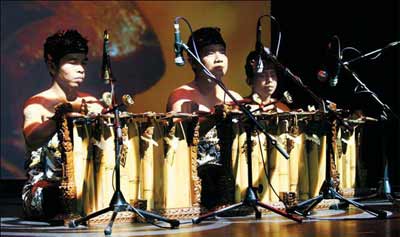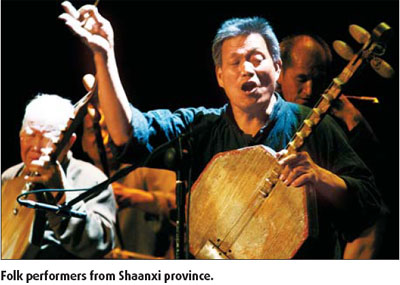
Percussionists from Indonesia giving a performance during the music festival. Photos courtesy of World Music Shanghai 2008
World-renowned groups such as Huun-Huur-Tu came together in Shanghai recently with unknown farmer musicians such as those of the Pumi ethnic group from Yunnan Province to present a kaleidoscopic view of music in the world.
World Music Shanghai 2008, held from April 30 to May 5, saw musicians from five foreign countries and five Chinese ethnic groups share the same stage at the first festival of world music in China.
"Much of our culture is passed down through drumming. When we play drums, we are showing our culture," says Ndikuriyo Terence, a player with the drum group Burundi Beat. "Other players were also showcasing their culture in their performances, and it felt like we were having some competition on stage."
Playing traditional Burundian drum music that is considered sacred and linked to regeneration and fertility, the 12-piece Burundi Beat energized the Shanghai Concert Hall on the first night of the festival.
"I was stunned by their drumbeats. I like to listen to loud rock music, but that cannot compare to the power of this music," says Shi Yang, a junior student from Shanghai University, after watching the Burundi Beat in action.
Khoomei, a form of singing that comes from Tuva, a small autonomous Russian republic on the Mongolian border, was the other major draw of the festival. The singers of Huun-Huur-Tu sang two parts - a bass part and an overtone in a higher pitch - at the same time. This technique is said to be based on the nomads' imitation of the wind whistling.
"Khoomei is a treasure of the Tuvan people. It is very much related to nature," says Sayan Bapa, a singer of Huun-Huur-Tu. "The Tuvan are a nomadic people. We live close to nature, hear the sounds of nature, and sing about nature."
Bapa used to play jazz and rock, but he found traditional Tuvan music deeper and more beautiful. In 1992, he co-founded Huun-Huur-Tu, which means "sunbeams", and has since taken Tuvan music all over the world.
Unlike professional musicians such as Huun-Huur-Tu, most musicians of the five Chinese groups who performed at World Music Shanghai still live as farmers, but the festival gave them an opportunity to present to Shanghai and the world their traditional music.

"I learned to sing as soon as I learned to speak. In our village we have choirs of different generations, from children to elderly people in their 70s or 80s," says Pan Peihua, a 24-year-old singer of the Dong people's choir from Xiaohuang, a village in Guizhou Province that is especially known for the singing of the "big songs"(da ge), a traditional multi-part a-cappella of the Dong people.
When the choir performed in Shanghai, they not only sang their songs, but also presented the context of those songs, such as farming and socializing.
Representing the Pumi people, one of the smallest ethnic groups in China with a population of only some 30,000, members of the Pumi Music Group are devoted to passing on their traditional music.
"Every time I tour to perform, I feel proud of my music. And when we return to our village, the others too feel proud of us," says Li Dongmei, a 21-year-old woman singer and kouxian (Jew's harp) player of the group.
Li says participating in the festival and performing on the same stage with musicians from other countries has encouraged her to continue playing Pumi music.
Besides performances, the festival also sparked exchange between musicians from different cultural backgrounds. Offstage, Iranian flute player Saied Shanbehzadeh demonstrated his flute techniques by playing to the Dolan musicians from Xinjiang Uygur autonomous region, while the Dolan musicians also tried gamelan instruments of the musicians from Indonesia.
Most Chinese musicians who performed at World Music Shanghai say they were not sure about the meaning of the term "world music", but Chen Zhe, a famous music producer and keen enthusiast of traditional music believes Chinese music will play an important role in world music.
"In 20 years, the whole world will come to China to look for music. In this part of the world, there are some virgin lands that produce beautiful music untouched by the outside world," he says.
The term "world music" became popular in the 1980s as a marketing device in the media and the music industry, and is generally used to classify traditional music of any culture created and played by indigenous musicians.
Chen believes "world music" refers not only to the various styles of traditional music, but also to the mixture of music that has both local elements and something in common for everybody to appreciate.
"People are always looking for communication, and only music can help realize communication between nation, through its sounds and emotions," he says.
For audiences in Shanghai, who are frequently exposed to music from the West, World Music Shanghai provided an opportunity to know about more music cultures in the world.
An event associated with the World Expo Shanghai, which will be held in 2010, World Music Shanghai will be held consecutively for three years. While this year's festival presented mostly traditional folk music, next year the festival will feature more fusion music.
(China Daily May 9, 2008)